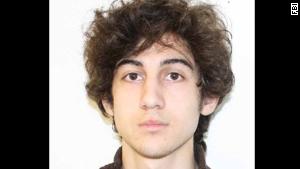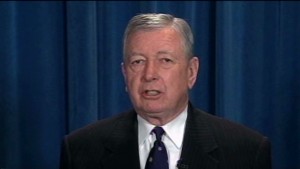Editor's note: Will Cain is a CNN contributor and co-host of Real News at The Blaze. Andrew C. McCarthy, a former federal prosecutor, is a contributor to National Review and author of "Willful Blindness: Memoir of the Jihad."
(CNN) -- Will Cain: Andy, who are we fighting in the war on terror? I don't mean to turn this into a freshman Political Science 101 question, but this is a pretty important issue. The answer to that question should protect us not only from terrorists, but also from the government depriving us of constitutional rights.
Sens. Lindsay Graham, John McCain and Kelly Ayotte and Rep. Peter King are all raising hell over the fact that Dzhokhar Tsarnaev -- one the of suspects in the Boston Marathon bombing -- wasn't designated an "enemy combatant" and held in military detention for interrogation. But I see nothing in the Authorization for Use of Military Force or the National Defense Authorization Act that takes away rights afforded to citizens (Dzhokhar is a U.S. citizen) by the Constitution.
Do you disagree?
Andy McCarthy: While I am not ready to go quite that far, designating Dzhokhar Tsarnaev as an enemy combatant would be very problematic. This is why I have repeatedly argued in the past few years that the 2001 AUMF is in need of an overhaul that reflects the current reality of the war on terror.
To be an enemy combatant one has to be part of the enemy. Under the AUMF, the enemy that Congress has authorized combat operations against includes only people, organizations or nations that carried out the 9/11 attacks and those who harbored them. This understates the actual enemy in time and scope, but the laws of war apply only to what Congress has authorized.
The reason I cannot go as far as you do is that we do not know enough yet. Al Qaeda, which is clearly covered by the AUMF, has operational ties to jihadist groups in Chechnya and Dagestan. It is conceivable that the Tsarnaevs -- particularly Tamerlan -- is connected with these groups and that they are complicit in the events in Boston. I am not arguing that this is likely; it is, however, plausible. Thus, I think that in wartime, with Congress having authorized military operations and with the interest in national security outweighing an individual detainee's interest in heightened due process, the executive branch would have been entitled to a short but reasonable period of military detention while it sorted out whether there is a meaningful connection to the enemy Congress has identified. But if there is no such connection, there is no legal authority to designate Dzhokhar Tsarnaev as an enemy combatant.
Become a fan of CNNOpinion Stay up to date on the latest opinion, analysis and conversations through social media. Join us at Facebook/CNNOpinion and follow us @CNNOpinion on Twitter. We welcome your ideas and comments.Cain: So, just to clarify. The AUMF authorizes combat operations against: "... those nations, organizations, or persons he determines planned, authorized, committed, or aided the terrorist attacks that occurred on September 11, 2001, or harbored such organizations or persons."
The NDAA expanded the enemy list from those involved in 9/11 to include "al Qaeda" and "associated forces." So:
1. We know this can include American citizens. There's a long history of American citizens joining the enemy side from German sabateours in WWII to Yasser Esam Hamdi.
2. It's unclear if it includes American citizens on American soil like Jose Padilla.
 No 'enemy combatant' label for suspect
No 'enemy combatant' label for suspect  Trying Boston suspect as enemy combatant
Trying Boston suspect as enemy combatant 3. But this is all predicated on the offender being connected to the "enemy."
You make two interesting points. One, it seems to me that holding people in detention for a "reasonable" amount of time because of "plausible" connections to al Qaeda (the enemy) until we know more is incredibly gray and open-ended. This is exactly what Graham, McCain, King and Ayotte are requesting.
What is a plausible connection? Anyone who has professed hatred of America? Any radical Islamist? Anyone who visits countries with an al Qaeda presence? And what is a reasonable amount of time? I'm not comfortable with these blurry lines when talking about depriving American citizens of Constitutional rights.
McCarthy: If that is what the senators and Rep. King are arguing, I think they're right. Listening to some of the commentary, my understanding was that some are saying it is permissible to designate someone an enemy combatant, irrespective of what Congress has authorized, simply because he has participated in a horrific act of terrorism.
To the contrary, the designation has to fit Congress' authorization. If these members of Congress are acknowledging that, then I'm with them.
By "plausible," I am not talking about six degrees of separation, or that al Qaeda reads in the paper about an attack it had nothing to do with and starts the Allahu Akbar! celebration. I am talking about a meaningful, operational connection -- one that, if you proved it in court, would be enough to show conspiracy or aiding and abetting the enemy. For example, an al Qaeda affiliate provides person A with paramilitary training and sends him back to America with the understanding that he will hook up with person B and they will use the training to commit terrorist acts.
Let's bear something else in mind. It's true that terms like "reasonable" time and "plausible" connection can sound like weasel words that would green-light consigning an American to indefinite detention on gossamer grounds. But there is a context here. Tsarnaev would be represented by counsel who could seek a writ of habeas corpus from the federal courts if what I envision as a reasonably brief period of temporary detention turned into something abusive. These safeguards were in place in the case of Padilla, whom you mention, and I think it provides confidence that the government can be kept honest.
Cain: I think they are asking for military detention as a kind of fact-finding mission to see if there are any connections to al Qaeda. The plausible connections you're talking about would be something discovered after detention, during interrogation. But what's justifying that detention, interrogation and fact finding in this case appears to be admission by Dzhokhar that he and his brother were influenced by radical Islam.
I'm just not comfortable with the government's authority in these gray areas. Which brings me to the second point I wanted to explore. It seems terrorism has evolved into this gray area. The distinction between al Qaeda inspired and al Qaeda connected is becoming less meaningful in the real world. I don't doubt that the war on terror, at its core, is a war on ideology. But I have no idea how you draft a limiting war document on an ideology that still constrains the areas where the state can set aside the constitutional protections. You said you would update the AUMF. How would you do that?
McCarthy: Well, I don't think it's appropriate to do a fact-finding mission just because one is curious. Detaining an American as an enemy combatant, even temporarily as a suspected enemy combatant, is a serious matter. It should not be done unless there are circumstances (e.g., connection of both Tamerlan and al Qaeda to jihadists in Chechnya and Dagestan) that give rise to a plausible suspicion. And, particularly under the AUMF as it exists, a connection to "radical Islamism" is not enough, nor even is a connection to violent jihadism. There has to be an operational connection to the enemy Congress has identified.
The distinction between "inspired" and "connected" is significant. The main reason for doing military commissions instead of civilian trials is to protect from disclosure our intel files on the enemy. If a jihadist is connected to al Qaeda, civilian discovery rules make this a real danger. If a jihadist is merely inspired by al Qaeda, he has no entitlement to such discovery, and thus, the case for consigning him to the military justice system is not nearly as strong.
As for updating the AUMF, it should acknowledge that our enemies are a loosely knit network of violent jihadist groups and their state sponsors, all of whom are animated by Islamic supremacism -- a mainstream interpretation of Islam, but by no means the only interpretation. Congress should specify all the currently known jihadist groups that fit this category and concretely outline the type of collusion with them that would render a person, organization or government part of the enemy.
Cain: So there is the answer to the core questions: Who are we fighting? Who is the enemy?
Your suggestion is to update the AUMF to specifically outline the radical jihadi groups who can be treated as "the enemy" in the war on terror. This, I think, is a step forward in acknowledging our real world threat, but also -- ironically -- limiting the state's power. By simultaneously making a more exhaustive but specific list of enemies, this would hopefully lead us away from the government being able to operate in the "gray areas" that make me nervous.
This would not (from what we know right now) allow al Qaeda inspired terrorists like Tsarnaev or Faisal Shahzad to be designated as "enemy combatants" and denied constitutional protections. I fear these types of terrorists are the new, rising, immediate threat.
Follow us on Twitter @CNNOpinion.
Join us on Facebook/CNNOpinion.
{ 0 comments... read them below or add one }
Post a Comment